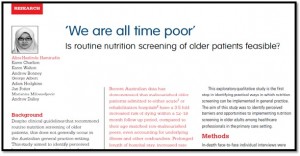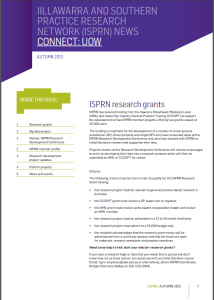Project: Engaging general practitioners to improve health service delivery to older patients: an action-based research project
Researchers: Dr Andrew Dalley1, Assoc. Prof Karen Charlton2, Clinical Professor Jan Potter3, Dr Karen Walton2, Professor Andrew Bonney1,2, Dr George Albert1, Dr Adam Hodgkins1, Dr Marianna Milosavljevic3, Mr Abhijeet Ghosh4 and Ms Aliza Haslinda Hamirudin2
1Illawarra and Southern Practice Research Network, NSW
2University of Wollongong, NSW
3Illawarra Shoalhaven Local Health District, NSW
4Illawarra-Shoalhaven Medicare Local, NSW
This participatory research project aims to introduce change in general practice that will improve health service delivery to older adults living in the community, focusing on early identification and management of malnutrition. This project is funded by Illawarra and Health Medical Research Institute (IHMRI) Clinical Grant and consists of three phases:
Phase 1: Situational analysis and action-based research (Ethics number: HE11/232)
I am very pleased to report outcomes of Phase 1 research completed in 2012 at three general practices of the Illawarra and Southern Practice Research Network (ISPRN). The three participating general practices are Shellharbour Medical Centre, Junction Street Family Practice and Culburra Beach General Practice. Barriers to, and opportunities for the introduction of a nutrition screening tool within routine practice were investigated through individual open-ended interviews with practice nurses and general practitioners. Interviews were audio-recorded, transcribed verbatim and analysed thematically using qualitative analysis software. An observational component was also performed to identify opportunities to conduct nutrition screening within the current workflow of participating practices. Lack of time was identified as the major barrier, which was further validated by observational data. Mean consultation time was 13.9 minutes, which would prohibit additional activities within a usual 15 minute consultation. The main opportunity identified was to include a validated nutrition screening tool within the current Medicare funded Health Assessment for adults aged 75+years (75+ HA).
Phase 1 research outcomes are as below:
- Peer-reviewed journal publication (Australian Family Physician in May 2013)
HAMIRUDIN, A.H., CHARLTON, K., WALTON, K., BONNEY, A., ALBERT, G., HODGKINS, A., POTTER, J., MILOSAVLJEVIC, M. & DALLEY, A. 2013. ‘We are all time poor’ Is routine nutrition screening of older patients feasible? Australian Family Physician, 42,321-326
1. Conference presentations
- Oral presentation at 16th International Congress of Dietetics, in Sydney (5- 8 September 2012)
- Poster presentation at 36th Nutrition Society of Australia Annual Scientific Meeting, in Wollongong (27- 30 November 2012)
- Oral presentation at the upcoming 20th IAGG World Congress of Gerontology and Geriatrics in Seoul, South Korea (23- 27 June 2013)
Phase 2: Development of model of care to include nutrition screening and management protocols (Ethics number: HE12/381)
Phase 2 research is currently underway at the same three participating general practices, the purpose of which is:
1. To introduce a resource kit to encourage use of the validated nutrition screening instrument (MNA-SF) within the Health Assessment for older persons aged over 75 years.
2. To improve the skills of general practice staff in identification and management of nutritional risk in older patients
3. To assess the feasibility of widespread uptake of the resource kit and MNA-SF within general practice settings.
Phase 3: Implementation and pilot-testing of a novel model of nutritional care
The third and final part of this project will be to investigate patient-related outcomes associated with routine screening for malnutrition and early identification of a need for referral to services. Results of Phase 2 research will inform study design and development of Phase 3. Phase 3 research is anticipated to be completed by end of 2013.
I would like to express my deepest gratitude to Illawarra and Health Medical Research Institute (IHMRI) for the funding; Illawarra and Southern Practice Research Network (ISPRN) and general practices staff as well as our research partners; Illawarra Shoalhaven Local Health District (ISLHD) and Illawarra-Shoalhaven Medicare Local (ISML) for your valuable contribution to this project. I look forward to great outcomes for Phases 2 and 3 of this project.
– Aliza Haslinda Hamirudin


